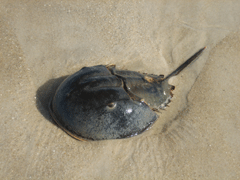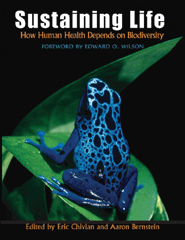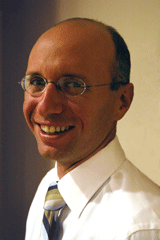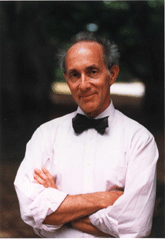Sustaining Life
Air Date: Week of June 27, 2008

The horseshoe crab is essential to keeping vaccinations safe. (Photo: Andrew Farrington)
Preventing species extinction isn't just good for the planet, it's also good for our health. Aaron Bernstein and Eric Chivian, co-editors of "Sustaining Life: How Human Health Depends on Biodiversity," talk with Living on Earth host Bruce Gellerman about why we should care about horseshoe crabs and microbes.
Transcript
Variety isn’t just the spice of life…it’s essential for life. According to the new book “Sustaining Life, How Human Health Depends upon Biodiversity,” we need birds, bugs, and bacteria a lot more than they need us. We use them for medicines, biomedical and agricultural research, and new materials. But we’re wiping out vast numbers of species and ultimately, we’ll pay the price. Joining me in the studio are the co-editors of “Sustaining Life,” Doctors Eric Chivian and Aaron Bernstein. Dr. Chivian is Founder and Director of Harvard Medical School’s Center for Health and the Global Environment. Dr. Bernstein is a research associate at the Center and a clinical fellow in pediatrics at Children's Hospital Boston and Boston Medical Center. Welcome to you both.
CHIVIAN: Thank you very much.
BERNSTEIN: Thanks Bruce.
GELLERMAN: Let me start with you, Dr. Chivian. Why a book on sustaining life, why a book on biodiversity?
CHIVIAN: More than a hundred scientists worked with Ari and myself in putting this book together. We did this because it’s been our sense that the loss of biodiversity and other issues like climate change are too abstract for people to grasp, it’s too far from their everyday life. And it was our conviction that if people really understood their connection to nature by looking at the impacts on their health from losing species then they would really do everything in their power to protect it.

BERNSTEIN: That’s right. If you look back at the history of our earth there have been five great extinction events and the present extinction event has been called the sixth because the rate of species loss is on par with the past five, the most recent of which was 65 million years ago.
That extinction event occurred as the result of an asteroid landing in the Gulf of Mexico and causing a huge cloud to essentially block off all sunlight on the Earth. That wiped out the dinosaurs as well as about half of all the species alive on earth at that time. The rate of species extinction then is about the same as the rate of species extinction today.
GELLERMAN: But the difference is that we’re responsible for it and not an asteroid.
BERNSTEIN: That’s correct.
CHIVIAN: So I think that it’s important for us to recognize that we are not endangering life on Earth, we are endangering ourselves. This conceit that we are so powerful that we are going to wipe out life on Earth is just a falsehood. It’s going to continue, evolve over several more millions of year and do just fine. But we may not be around to see it.
GELLERMAN: One of the animals that has defied, kind of, evolutionary history is the horseshoe crab. I mean it’s been around forever and ever and it hasn’t changed much. And I didn’t realize the important place it holds in the pharmacopedia of the world?
BERNSTEIN: Yeah anyone listening to this who feels old all you have to do is read about the horseshoe crab and you’ll feel like a kid again.
GELLERMAN: 50 million years.
BERNSTEIN: Yeah and then some. Horseshoe crabs are the great survivors of evolution and the FDA’s gold standard test to detect the presence of bacterial contamination or vaccine supply. When I give a child a vaccine, which is probably the most important thing I do as a doctor to prevent disease, how do I know that that vaccine is safe?

Dr. Aaron Bernstein.
GELLERMAN: How many species are there on the planet? Do we know?
CHIVIAN: Well scientists have identified somewhere between 1.5 and 1.75 million species that they’ve given Latin names to. And there are estimates anywhere from ten times that to even a hundred times that. But it’s clear that we only know a small fraction of the species on Earth. We know very little for example about species in the deep oceans. We know almost nothing about microbial species. There have been for example 700 distinct bacterial species identified in the human mouth alone. There’s a termite whose guts have been opened up and they identified more than 400 different bacterial microbial species in the gut of that termite. Does another termite have another 400? We know almost nothing about life on this planet.
GELLERMAN: One of the fascinating parts about your book is how you connect the dots, how you make diversity matter to me. And it’s the microbes that take center stage.
BERNSTEIN: I think it’s easier for people to grasp what we like to call the charismatic mega-fauna. These are the critters that are kept in zoos and they can really visualize them and have a sense that they exist. The reality though is that the microbial world is not only where the majority of genetic diversity exists. But it’s also where our health depends in immeasurable proportions on. The antibiotics I prescribe everyday in my practice that I give to children to treat common childhood diseases through most life-threatening diseases we see come from microbes. Without those microbes we wouldn’t have those medicines.
GELLERMAN: You write about the South American Leap Frog and you say it has the potential of antibiotic library of enormous potential. The Leap Frog?
BERNSTEIN: The Leap Frog. One of the extraordinary attributes of many amphibians are antimicrobial peptides that they secrete on to their skins. And while we don’t fully understand why they do this we do know that the compounds may be extraordinarily important for the treatment of bacterial infections. Most antibiotics we use when we use them too much the bacteria develop resistance so if we keep using the antibiotic it no longer is able to treat the infection. And what the frog skin peptides have been shown to be capable of are essentially assaulting bacteria in ways that make them incapable of becoming resistant to them.

Dr. Eric Chivian
BERNSTEIN: They are among the most threatened groups of organisms on Earth. About a third of all amphibian species are threatened with extinction.
GELLERMAN: I wanted to ask you about this frog that swallows its own eggs and then delivers a live birth. And you say that something in that frog’s stomach, which will maybe help us cure ulcers?
CHIVIAN: The Gastric Brooding Frog, there are two known species. They were both found in Australia. The female swallows the fertilized eggs. The eggs hatch in her stomach. They become tadpoles and when they reach a certain level of development the mother vomits them out into an aquatic environment where they complete their development and become adults. Now all amphibians, all vertebrates, us as well, begin the process of digestion in our stomachs. We release acid and enzymes that starts digesting our food. So these tadpoles were found to secrete substances to stop the acid, to stop the enzymes, and to prevent them being emptied into the intestines. So scientists began to study these compounds because yes we have some ways of treating peptic ulcer disease, which affects 25 million Americans. But these compounds may have worked by a completely different mechanism, may have been much more effective than what we now do to treat ulcers but these studies had to stop because both species of Gastric Brooding Frogs went extinct. We will never know what those compounds were.
GELLERMAN: It seems like we’re sawing off entire limbs of our family tree, of the tree of life.

The horseshoe crab is essential to keeping vaccinations safe. (Photo: Andrew Farrington)
GELLERMAN: If there was one species that you could save right now that’s endangered that really has consequence today in our lives, what would it be?
CHIVIAN: I don’t think I can answer that. I think if we were talking about groups of species I could answer that and I would give you several candidates because all life on earth is dependent on it. Plants, we have no oxygen without plants. Microbes, of all types, the microbes that break down decaying organisms and return the nutrients to the soil and to the oceans. Nitrogen-fixing bacteria. We would have very few crops without nitrogen-fixing bacteria putting nitrogen that’s unusable from the atmosphere into the soil.
You know I’m somewhat biased as a member of the homosapiens, that I think I would like to save us, because we’re such a powerful force unfortunately for destruction but we’re also a potentially powerful force for good. And that’s why we dedicate this book to not only the plants and animals and microbes that we share this planet with, but we dedicate this book to homosapiens, our own species. And we say to them, “May we have the wisdom and the love for our children and for all children to come, to save the indescribably beautiful and precious gift we have been given.”
GELLERMAN: Well, Dr. Chivian, thank you so very much, really appreciate it.
CHIVIAN: My pleasure.
GELLERMAN: And Dr. Bernstein, thank you very much.
BERNSTEIN: A great pleasure Bruce, thank you.
GELLERMAN: Dr. Eric Chivian shared the noble peace prize in 1985, Dr. Aaron Bernstein is a pediatrician in Boston. They’re co-editors of the new book from Oxford University Press, “Sustaining Life: How Human Health Depends upon Biodiversity”.
Links
Living on Earth wants to hear from you!
Living on Earth
62 Calef Highway, Suite 212
Lee, NH 03861
Telephone: 617-287-4121
E-mail: comments@loe.org
Newsletter [Click here]
Donate to Living on Earth!
Living on Earth is an independent media program and relies entirely on contributions from listeners and institutions supporting public service. Please donate now to preserve an independent environmental voice.
NewsletterLiving on Earth offers a weekly delivery of the show's rundown to your mailbox. Sign up for our newsletter today!
 Sailors For The Sea: Be the change you want to sea.
Sailors For The Sea: Be the change you want to sea.
 Creating positive outcomes for future generations.
Creating positive outcomes for future generations.
 Innovating to make the world a better, more sustainable place to live. Listen to the race to 9 billion
Innovating to make the world a better, more sustainable place to live. Listen to the race to 9 billion
 The Grantham Foundation for the Protection of the Environment: Committed to protecting and improving the health of the global environment.
The Grantham Foundation for the Protection of the Environment: Committed to protecting and improving the health of the global environment.
 Contribute to Living on Earth and receive, as our gift to you, an archival print of one of Mark Seth Lender's extraordinary wildlife photographs. Follow the link to see Mark's current collection of photographs.
Contribute to Living on Earth and receive, as our gift to you, an archival print of one of Mark Seth Lender's extraordinary wildlife photographs. Follow the link to see Mark's current collection of photographs.
 Buy a signed copy of Mark Seth Lender's book Smeagull the Seagull & support Living on Earth
Buy a signed copy of Mark Seth Lender's book Smeagull the Seagull & support Living on Earth

